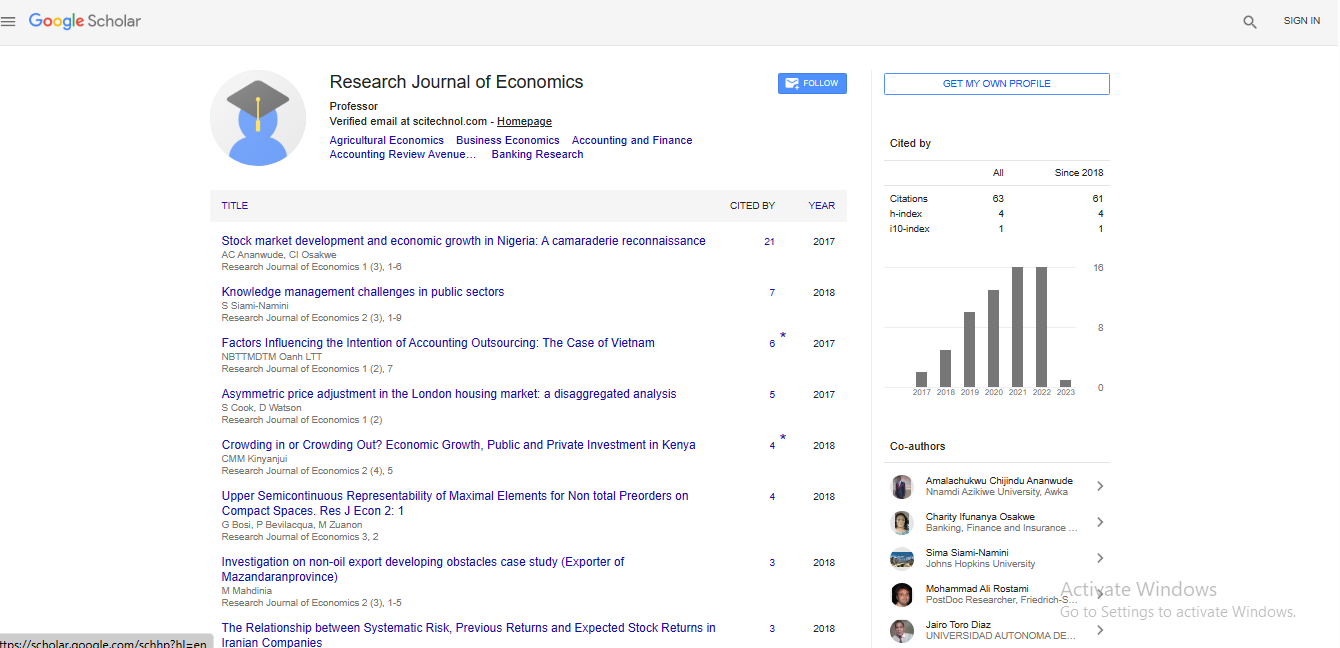Perspective, Res J Econ Vol: 7 Issue: 5
The Importance of Accounting: Its Principles and Components.
Daniel Feng*
1Department of Accounts, University of Louisville, Louisville, USA
*Corresponding Author: Daniel Feng,
Department of Accounts, University of
Louisville, Louisville, USA
E-mail: fengdan_iel@edu.cn
Received date: 01 September, 2023, Manuscript No. RJE-23-117594;
Editor assigned date: 04 September, 2023, PreQC No. RJE-23-117594 (PQ);
Reviewed date: 18 September, 2023, QC No. RJE-23-117594;
Revised date: 25 September, 2023, Manuscript No. RJE-23-117594 (R);
Published date: 02 October, 2023 DOI: 10.4172/RJE.1000169
Citation: Feng D (2023) The Importance of Accounting: Its Principles and Components. Res J Econ 7:5.
Description
Accounting is often referred to as the "language of business" because it serves as a comprehensive system for recording, analyzing, and interpreting financial information. It plays a pivotal role in every organization, providing crucial insights into its financial health, performance, and decision-making.
The importance of accounting
Accounting is the foundation upon which businesses and other entities operate, helping them monitor their economic activities and resources. It ensures transparency, accuracy, and consistency in financial reporting, making it possible for stakeholders to make informed decisions. Some of the key reasons why accounting is crucial are:
Financial reporting: Accounting produces financial statements, such as the income statement, balance sheet, and cash flow statement, which communicate the financial position and performance of a company to shareholders, investors, creditors, and other stakeholders.
Compliance: Accounting is essential for regulatory compliance, ensuring that organizations meet legal requirements and standards set by accounting bodies and government authorities.
Decision-making: Managers rely on accounting information to make critical decisions regarding investments, expansion, cost control, and resource allocation.
Investor confidence: Accurate and reliable accounting instills confidence in investors and lenders, leading to more significant investments and lower borrowing costs.
Fundamental principles of accounting
Going concern: Assumes that a business will continue to operate indefinitely, allowing financial statements to be prepared under the assumption of continuity.
Consistency: Requires a company to apply the same accounting methods and principles consistently from one period to another for better comparability.
Materiality: Emphasizes the disclosure of all relevant financial information that could influence the decision-making of users.
Prudence: Encourages the conservative treatment of uncertainties, potential losses, and liabilities, ensuring that they are adequately recognized and disclosed.
Substance over form: Requires transactions to be recorded based on their economic substance rather than merely their legal form.
Historical cost: Assets are recorded at their original cost, simplifying the accounting process and maintaining objectivity.
Monetary unit: Requires financial transactions to be measured and reported in a common monetary unit (e.g., the local currency).
Components of accounting
Bookkeeping: The first step in the accounting process involves recording financial transactions in journals and ledgers, ensuring an accurate representation of the company's economic activities.
Financial statements: The culmination of the accounting process, financial statements provide a summary of a company's financial position and performance over a specific period.
• Income statement presents a company's revenues, expenses, and net income (or net loss) for a particular period, indicating its profitability.
• Balance sheet represents a snapshot of a company's assets, liabilities, and equity at a specific point in time, providing insights into its financial position.
• Cash flow statement tracks the inflows and outflows of cash during a specific period, highlighting a company's ability to generate and utilize cash.
Auditing: External auditors review a company's financial statements to ensure compliance with accounting standards and verify their accuracy and reliability.
Management accounting: Provides internal reports and analysis to assist management in making strategic decisions, budgeting, and cost control.
Cost accounting: Focuses on determining and allocating costs to products, services, or projects, aiding in pricing decisions and cost optimization.
Tax accounting: Involves complying with tax regulations and preparing tax returns accurately.
Accounting serves as the language of business, providing a structured framework for recording and interpreting financial information. Its role in financial reporting, decision-making, compliance, and stakeholder confidence is paramount. By adhering to fundamental accounting principles and adopting standardized frameworks, businesses can communicate their financial performance effectively and enhance their operations in an increasingly interconnected global economy. As technology and the business landscape evolve, accounting will continue to play a central role in facilitating economic progress and informed decision-making.
 Spanish
Spanish  Chinese
Chinese  Russian
Russian  German
German  French
French  Japanese
Japanese  Portuguese
Portuguese  Hindi
Hindi 